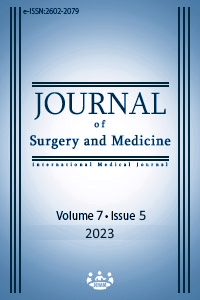A retrospective study of the effects of anesthesia methods on post-operative delirium in geriatric patients having orthopedic surgery: Anesthesia methods on post-operative delirium
Anesthesia methods on post-operative delirium
Keywords:
post-operation, geriatric, spinal anesthesia, general anesthesia, deliriumAbstract
Background/Aim: Post-operative delirium, which usually develops in geriatric patients, also causes an increase in mortality and morbidity for various reasons, such as difficulty in compliance with treatment. Estimating the effects of the anesthesia method on delirium contributes to the prevention of possible complications. In this study, effects due to use of different anesthesia methods on the post-operative delirium development in geriatric patients who underwent orthopedic surgery were investigated.
Methods: In our retrospective cohort study, scanning of the patient files was performed for 276 patients who were older than 65 years and who had undergone surgery for lower extremity fractures in Malatya education and research hospital, orthopedics department between May 1, 2022 and October 15, 2022. Demographic data, comorbid conditions, anesthesia type, lengths of surgery, and level of delirium development were recorded for each scanned patient.
Results: In our study, 201 patients were included. The mean age of the patients was 74.1 (7.3) (min–max: 65–98); 133 (66.2%) were female, and 68 (33.8%) were male. It was noticed that patients who had undergone regional anesthesia developed a significantly smaller rate of delirium development (8.1%) compared to those who had received general anesthesia (20.6%; P=0.012). Ages (P<0.001), lengths of surgery (P<0.001), and lengths of hospitalization stays (P<0.001) were significantly higher in patients with delirium compared to those without.
Conclusion: Based on the data obtained in this study, it was concluded that to reduce the risk of delirium development after orthopedic surgery, regional rather than general anesthesia should be selected, and the time of hospitalization stay should be minimized.
Downloads
References
Motz Bettelli G. Preoperative evaluation in geriatric surgery: comorbidity, functional status and pharmacological history. Minerva Anestesiol. 2011 Jun;77(6):637-46.
Ulukan U. Demographic Change in Turkey and Older Workers. Fiscaoeconomia 2020;4:94-110 DOI: https://doi.org/10.25295/fsecon.2020.01.005
Robertson BD, Robertson TJ. Postoperative delirium after hip fracture. J Bone Joint Surg Am. 2006;88:2060-8. DOI: https://doi.org/10.2106/JBJS.F.00049
Cole MG. Delirium in elderly patients. Am J Geriatr Psychiatry. 2004 Jan-Feb;12(1):7-21 DOI: https://doi.org/10.1097/00019442-200401000-00002
Abouleish AE, Leib ML,Cohen NH. ASA Provides Examples to Each ASA Physical Status Class. ASA Newsletter. 2015;79:38-49.
Dodds C, Murray D. Pre-operative assessment of the elderly. Continuing Education in Anaesthesia, Critical Care & Pain. 2001;1:181-4. DOI: https://doi.org/10.1093/bjacepd/1.6.181
Chow WB, Rosenthal RA, Merkow RP, Ko CY, Esnaola NF; American College of Surgeons National Surgical Quality Improvement Program, et al. Optimal preoperative assessment of the geriatric surgical patient: a best practices guideline from the American College of Surgeons National Surgical Quality Improvement Program and the American Geriatrics Society. J Am Coll Surg. 2012;215:453-66. DOI: https://doi.org/10.1016/j.jamcollsurg.2012.06.017
Liu JL, Wang XL, Gong MW, Mai HX, Pei SJ, Yuan WX, et al. Comparative outcomes of peripheral nerve blocks versus general anesthesia for hip fractures in geriatric Chinese patients. Patient Prefer Adherence. 2014 May 7;8:651-9. DOI: https://doi.org/10.2147/PPA.S61903
Luger TJ, Kammerlander C, Gosch M, Luger MF, Kammerlander-Knauer U, Roth T, et al. Neuroaxial versus general anaesthesia in geriatric patients for hip fracture surgery: does it matter? Osteoporos Int. 2010;21(4):555-72. DOI: https://doi.org/10.1007/s00198-010-1399-7
Güntürk S, Aydın G, Alaygut E, Karaman Y, Bozkurt P. Effect of the Anesthesia Method on Mortality and Postoperative Complications in ASA III-IV Graded Geriatric Patients. The Journal of Tepecik Education and Research Hospital. 2019;29:223-8. DOI: https://doi.org/10.5222/terh.2019.37880
Qiu C, Chan PH, Zohman GL, Prentice HA, Hunt JJ, LaPlace DC, et al. Impact of Anesthesia on Hospital Mortality and Morbidities in Geriatric Patients Following Emergency Hip Fracture Surgery. J Orthop Trauma. 2018;32:116-23. DOI: https://doi.org/10.1097/BOT.0000000000001035
Neuman MD , Silber JH , Elkassabany NM , Ludwig JM, Fleisher LA. Comparative effectiveness of regional versus general anesthesia for hip fracture surgery in adults. Anesthesiology. 2012;117:72-92. DOI: https://doi.org/10.1097/ALN.0b013e3182545e7c
Whitlock EL, Vannucci, A, Avidan, MS. Postoperative delirium. Minerva Anestesiol. 2011;77:448-56.
Packard RC. Delirium. Neurologist. 2001;7:327-40. DOI: https://doi.org/10.1097/00127893-200111000-00002
Rudolph JL, Inouye SK, Jones RN, Yang FM, Fong TG, Levkoff SE, Marcantonio ER, et al. Delirium: an independent predictor of functional decline after cardiac surgery. J Am Geriatr Soc. 2010;58(4):643-9 DOI: https://doi.org/10.1111/j.1532-5415.2010.02762.x
Grover S, Shah R. Delirium-related distress in caregivers: a study from a tertiary care centre in India. Perspect Psychiatr Care. 2013;49:21-9. DOI: https://doi.org/10.1111/j.1744-6163.2012.00335.x
Atay I, Aslan A, Atay T, Burc H. Prevalence of delirium, risk factors and cognitive functions in elderly hip fracture patients with general and spinal anesthesia. Turkish Journal of Geriatrics. 2012;15:273-8.
Atay T, Yaman E, Baykal YB, Kirdemir V, Baydar ML, Aslan,A. Postoperative Clinical And Radiological Length Differences In Elderly Patients Who Underwent Partial Endoprosthesis Surgery. Turkish Journal of Geriatrics. 2010;13:238-43.
Alpantaki K , Papadaki C , Raptis K , Dretakis K , Samonis, G, Koutserimpas C. Gender and Age Differences in Hip Fracture Types among Elderly: a Retrospective Cohort Study. Maedica (Bucur). 2020;15:185-90.
Marcantonio E, Ta T, Duthie E, Resnick NM. Delirium severity and psychomotor types: their relationship with outcomes after hip fracture repair. J Am Geriatr Soc. 2002;50:850-7. DOI: https://doi.org/10.1046/j.1532-5415.2002.50210.x
Parker MJ, Handoll HH, Griffiths R. Anaesthesia for hip fracture surgery in adults. Cochrane Database Syst Rev. 2004;CD000521. DOI: https://doi.org/10.1002/14651858.CD000521.pub2
Bjorkelund KB, Hommel A, Thorngren KG, Lundberg D, Larsson S. Factors at admission associated with 4 months outcome in elderly patients with hip fracture. AANA J. 2009;77:49-58.
Downloads
- 891 714
Published
Issue
Section
How to Cite
License
Copyright (c) 2023 Leman Acun Delen, Zeliha Korkmaz Disli
This work is licensed under a Creative Commons Attribution-NonCommercial-NoDerivatives 4.0 International License.
















